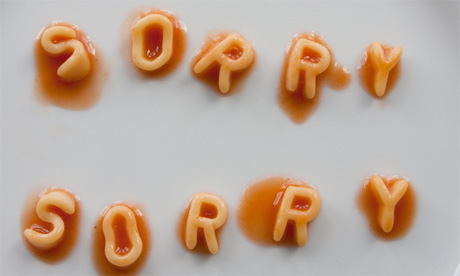Not long after I met my husband at the book store where we both worked, he asked me why I apologized constantly. "You're always saying you're sorry, even when something couldn't possibly be your fault." No one else had really called me on that before, and it took me a minute to answer.
"Wow, sorry..." We both laughed, and obviously, the relationship worked out, but even then, I didn't wise up to the fact that my default reply was one of apology. It wasn't just a verbal tic, either. I always felt like I should be sorry for something. For years, I had been a single mom, working at retail jobs while going to school. My parents helped me and I felt bad about that, and I always seemed to be falling short at work, or with the kids, or at school. I was late, or forgot something, or needed an extension or had to cancel something or missed something at school. Disappointment was a constant theme, and I could think of no one to blame but myself.
So, mea freaking culpa!
I think this was compounded by the work I did. One of the main tasks for a retail manager is smoothing out customer service difficulties. I apologized fifty to a hundred times a day, sometimes just because people had to wait in line for a minute before they had a chance to pay for their items. Sometimes, because someone bought the wrong thing and wanted to return it. That's right, I told people I was sorry because they had made a mistake. Sheesh!
This morning, my friend shared a link to this article from the New York Times website (thanks, Alex!) and I had a moment of thinking: "someone gets it." I was glad to see that the someone, Katrina Alcorn, has written a book called Maxed Out: American Moms on the Brink about the weight of the high expectations that are crushing many moms today. The book came out in September, but of course, I haven't gotten to it yet. Sor-- no I'm not going to say it. Anyway, from what I've read, in the blurb and in the Times article by K. J. Dell'Antonia this morning, the book springs from Alcorn's own story. She was a busy, successful mom who tried to have it all and found herself crumbling under the pressure. Sounds kinda familiar, huh?
The New York Times article talks about how we women find ourselves "apologizing for failing to do the impossible," and how our impulse to do the impossible flows from the widely held, but genuinely misguided, belief that we can "have it all." All we need to do is plan, prioritize, lean in, focus, breathe, etc. Alcorn contends that, because we are told we could do it all-- and do it all well, mind you-- if we just put our mind to it, we always feel that there is something that we are not doing right, so we apologize all the time.
I think the point Alcorn is trying to make is that we need to think about the problem differently. Instead of asking ourselves what we can do better, we need to question the myth of "work-life balance." Maybe in a world full of princesses, unicorns and wand-wielding fairy godmothers, we could expect to live a fantasy life where we work at fascinating jobs that pay well and give us plenty of time off to spend with our families. In reality, many women I know have jobs that are barely covering their expenses, mostly because the biggest chunk of those expenses goes to childcare. And the irony gets uglier: we would like to spend more time with our kids, but by the time we get home, we're so tired and stressed out that all we can do is yell and wheedle until bedtime finally rolls around.
Then, the cycle of apologies really sets in. We're sorry about everything, especially when it seems that the choices we have made, the goals we have devised, have somehow set us up for failure. Apparently, Alcorn understands that the circumstances of our culture contribute to our sorrow. I think that's true, for the most part, but at some point, when we see that our own expectations are causing us trouble, we have to reconsider our lives and make some difficult choices. If "having it all" is a pipe dream, a fantasy, a unicorn wearing a crown of diamond-studded daises, then we have to think about what not having it all might mean. We have to think about opting out in some areas, so that we can improve, and maybe even enjoy, others.
Most of us can't choose not to work, and we certainly can't decide to give back the kids, so we have to ease up on our expectation of what being a working mother-- and every mother is a working mother-- is supposed to be like. If we can actually give ourselves a break, give ourselves permission to be less than perfect, permission to just be real, then maybe we can stop apologizing all the time. If we can't, then we are really going to be sorry.
Alphabet letters image from here, photo credit to Alexandra Bone.

I couldn't have said it better myself! Is encouraging to know that I'm not alone in my struggle to be everything to everyone, then feel guilty and apologetic when I'm not.
ReplyDeleteThat's the thing-- we just have to let ourselves believe that it is okay not to be superwomen. Doing our best is the best we can do!
Deletewe can only attempt to do our level best,Sorry is an easiest word, but sometimes it gets overused.
ReplyDelete